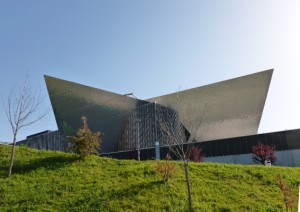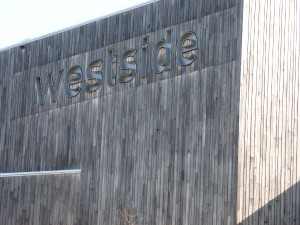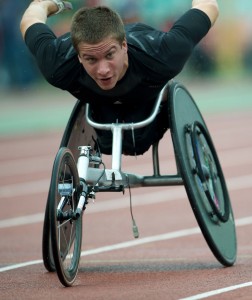 For enthusiasts of the Jewish Museum, excursions to other Libeskind buildings are imperative. Many are thematically related to the JMB, such as the Felix-Nussbaum-Haus in Osnabrück or the Jewish Museum in San Francisco. But equally worthwhile are the buildings designed for entirely other purposes, such as Westside, a suburban shopping mall completed in 2008 over a highway outside of Berne, Switzerland.
For enthusiasts of the Jewish Museum, excursions to other Libeskind buildings are imperative. Many are thematically related to the JMB, such as the Felix-Nussbaum-Haus in Osnabrück or the Jewish Museum in San Francisco. But equally worthwhile are the buildings designed for entirely other purposes, such as Westside, a suburban shopping mall completed in 2008 over a highway outside of Berne, Switzerland.
 The mall – despite, well, being a mall – shares many features with the Jewish Museum, which was Libeskind’s first building project. The well-trained, or perhaps overly-trained, eye may involuntarily pick up on architectural testimonies to German-Jewish history. → continue reading
The mall – despite, well, being a mall – shares many features with the Jewish Museum, which was Libeskind’s first building project. The well-trained, or perhaps overly-trained, eye may involuntarily pick up on architectural testimonies to German-Jewish history. → continue reading
Maybe I should have fasted, but instead, I was rubbing my injured knee and wrist, picking up my bicycle from the road where I’d fallen.
 On Yom Kippur, the Day of Atonement, one is supposed to reflect on one’s sins over the last year, to apologize to friends and family, to pray and to fast. And as it is the holiest of all Jewish holidays, it is widely respected in Israel, even by atheists. Trains, buses, and airplanes all stop running; shops and restaurants remain closed; even driving a car is taboo. And so, with the streets and highways empty and nothing on the radio or TV, it has become the perfect occasion for those of us who don’t take atonement all that seriously to go out for a bike ride. → continue reading
On Yom Kippur, the Day of Atonement, one is supposed to reflect on one’s sins over the last year, to apologize to friends and family, to pray and to fast. And as it is the holiest of all Jewish holidays, it is widely respected in Israel, even by atheists. Trains, buses, and airplanes all stop running; shops and restaurants remain closed; even driving a car is taboo. And so, with the streets and highways empty and nothing on the radio or TV, it has become the perfect occasion for those of us who don’t take atonement all that seriously to go out for a bike ride. → continue reading
Just a few weeks ago in Stoke Mandeville, England, a large bronze statue was unveiled in honor of a Jewish physician from Breslau, who – despite his moving story, his pioneering efforts, and the international significance of his work in Germany – is virtually unknown here:

Marc Schuh, wheelchair racer (medium distance), member of the German team at the London Paralympics, 2012 © Behinderten-Sportverband Berlin e.V.
Ludwig Guttmann, the father of the Paralympic Games that were opened in London on 29 August. More than two and a half million spectators will cheer on the over 4,000 athletes there. Guttmann is well-known in Britain, where he was awarded the Order of the British Empire and where the BBC made a film about him entitled “The Best of Men.”
Ludwig Guttmann was born to an orthodox Jewish family in Tost, Upper Silesia in 1899. He grew up in Chorzów, where he worked at the hospital for the first time with paraplegics. Following his medical training in Breslau and Freiburg, he specialized in the young field of neurosurgery from 1924 and was soon considered one of its leading doctors. After Hitler’s rise to power in 1933, Guttmann was no longer permitted to practice in a public hospital. Despite several offers from America, he stayed in Germany and took up a specialist post at the Jewish Hospital in Breslau where he later became director. When he learned of the violent excesses during the November Pogrom in 1938, he instructed his staff to admit all refugees to the hospital without examination. In spite of a Gestapo investigation at the hospital, he was able to save 60 Jewish citizens from arrest and deportation to a concentration camp. → continue reading
 For enthusiasts of the Jewish Museum, excursions to other Libeskind buildings are imperative. Many are thematically related to the JMB, such as the Felix-Nussbaum-Haus in Osnabrück or the Jewish Museum in San Francisco. But equally worthwhile are the buildings designed for entirely other purposes, such as Westside, a suburban shopping mall completed in 2008 over a highway outside of Berne, Switzerland.
For enthusiasts of the Jewish Museum, excursions to other Libeskind buildings are imperative. Many are thematically related to the JMB, such as the Felix-Nussbaum-Haus in Osnabrück or the Jewish Museum in San Francisco. But equally worthwhile are the buildings designed for entirely other purposes, such as Westside, a suburban shopping mall completed in 2008 over a highway outside of Berne, Switzerland. The mall – despite, well, being a mall – shares many features with the Jewish Museum, which was Libeskind’s first building project. The well-trained, or perhaps overly-trained, eye may involuntarily pick up on architectural testimonies to German-Jewish history. → continue reading
The mall – despite, well, being a mall – shares many features with the Jewish Museum, which was Libeskind’s first building project. The well-trained, or perhaps overly-trained, eye may involuntarily pick up on architectural testimonies to German-Jewish history. → continue reading
